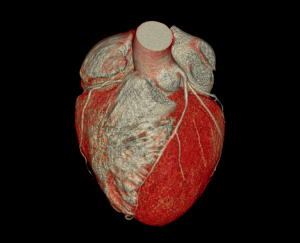by
John R. Fischer, Senior Reporter | October 31, 2019

Performing a low-dose CT scan may better
help determine who is at risk of coronary
heart disease
Performing a low-dose CT scan as an additional test may help identify patients at risk of a heart attack.
That’s what researchers plan to determine in a study that will involve more than 90,000 patients at the Intermountain Healthcare Heart Institute in Utah. The aim of the Intermountain Coronary Calcium study (CorCal study) is to find and alert patients at high risk of developing coronary heart disease before they suffer a heart event.
"Low-dose CT produces a coronary artery calcium score that has been validated to predict future risk of a heart attack better than any other imaging modality," Dr. J. Brent Muhlestein, principal investigator of the study and co-director of cardiovascular research at the Intermountain Healthcare, told HCB News. "It is fast and easy, taking less than five minutes to perform the entire test. It is non-invasive and does not require even an IV to be placed. It has very low dose radiation, about the same amount as a single mammogram, and it is very inexpensive."



Ad Statistics
Times Displayed: 172809
Times Visited: 3130 For those who need to move fast and expand clinical capabilities -- and would love new equipment -- the uCT 550 Advance offers a new fully configured 80-slice CT in up to 2 weeks with routine maintenance and parts and Software Upgrades for Life™ included.
American Heart Association guidelines focus on testing cholesterol levels using a lipid panel blood test, with the findings combined with other information to calculate an atherosclerotic cardiovascular disease risk score, which indicates how likely a person is to develop heart disease in the next 10 years. Researchers use this as guidance for prescribing appropriate prevention treatments.
The study will assess how effective this strategy is by selecting one group of patients to receive just a lipid panel test, while another group will receive it along with a CT heart scan to determine the build-up of calcium levels within the arteries. The presence of coronary calcium is a sign of build-up in atherosclerotic plaque in the arteries of the heart and brain, and is associated with an increased risk of a heart attack or stroke in the future.
Participants will be between the ages of 50 and 85 years old, not be on statins at the time of the study, and have no history of diabetes or vascular disease of the heart. Outcomes of death, heart attack or stroke will be monitored by serially querying the Intermountain Healthcare electronic health record and the National Death Index. In addition, subjects will be contacted three months after initial enrollment and recommendations and then every year thereafter to respond to short questionnaires about adherence to study recommendations and reasons for non-adherence.
"The cost of a CT coronary artery calcium scan is really quite low and only needs to be done once," said Muhlestein. "Presently insurance doesn't cover the cost of the scan because a study like CorCal that will determine its true efficacy has not yet been accomplished. If the primary aims of this study are met, and if adding a CT coronary artery calcium scan to a lipid panel really does provide a better way to screen and treat patients to prevent future heart complications, it is expected that insurance companies will begin cover the cost."
Registration will take place online, with researchers reaching out to potential enrollees via email or mail. Intermountain Healthcare’s EMR system will be used to identify patients who meet the study criteria. Researchers may contact primary care physicians to recommend if a patient should begin taking statins and/or asprin to prevent potential future heart events, if deemed necessary based on their findings during the study.
Funding for the study was provided through a donation and funding by Utah businessman Dell Loy Hansen who will announce the launch of the study with the researchers.
The study is scheduled to run until March 2023.

